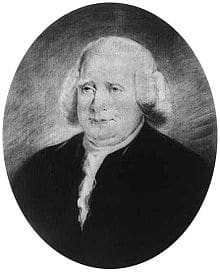Carter Braxton (September 10, 1736 – October 10, 1797) was a politician, planter, and signer of the Declaration of Independence.
He served alongside fellow Virginia delegates: Thomas Jefferson, Richard Henry Lee, George Wythe, Benjamin Harrison, Thomas Nelson Jr., and Francis Lightfoot Lee.
He was the son of a Virginia plantation owner and the grandson of one of the wealthiest men in land and slaves.
Unlike many of the Virginians who were considered radicals, Braxton was considered a more moderate politician.

Overview
- Braxton was educated at William and Mary and would marry shortly after college to Judith Robinson.
- Their marriage was short-lived, as she died two years later and left Braxton with two daughters. He married again in 1760 to Elizabeth Corbin and was elected to the Virginia House of Burgesses.
- He began a successful political career and was elected to the Virginia Convention.
- After the death of Peter Randolph, he was elected to take his place at the Continental Congress. Here, he would serve and sign the Declaration of Independence.
- Carter Braxton was a wealthy man and slaveholder. He invested much of his money in the war for Independence.
- He helped fund the shipping and privateering until Congress censured him for seizing a neutral Portuguese ship.
- Throughout the war, Braxton's land was pillaged and destroyed by the British, and it left him a much less wealthy man. He would never be able to overcome what he lost during the war and accumulated much debt from it.
- Carter Braxton died on October 10, 1797.
Charles Goodrich had this to say about Carter Braxton:
The latter days of Mr. Braxton were embittered by several unfortunate commercial speculations, which involved him in pecuniary embarrassments, from which he found it impossible to extricate himself. Several vexatious lawsuits, in which he became engaged, contributed still further to diminish his property and unfortunately led him unintentionally to injure sevral of his friends, who were his sureties. The morning of his days was indeed bright, but, like many a morning which appears in the natural world without clouds, his was followed, towards the close of the day, by clouds and darkness, under which he sunk, imparting an impressive lesson of the passing nature of the form and fashion of the present world.

